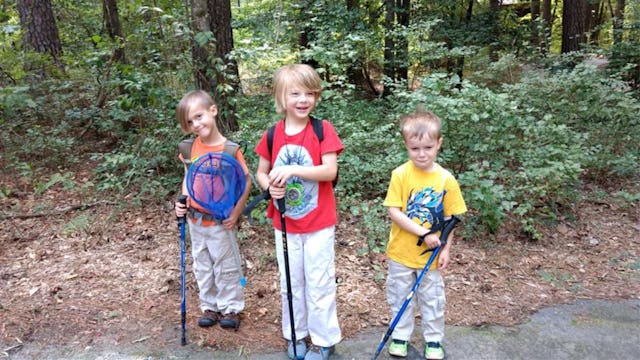Stop Saying My Sons With ADHD Are 'Bad'

They don’t say it to my face. They don’t have to. I hear the murmurs. I hear the backtalk, the rumors. My kids are bad. My kids are wild. Other parents don’t want their darlings to play with them. They play rougher: they run, they jump off playground equipment. They climb where climbing is not permitted, they jump where jumping is not allowed. They bring sticks places where sticks are not supposed to be, then begin a lightsaber battle. They talk out of turn. They blurt things out. My youngest throws screaming tantrums. My middle child throws crying tantrums. My oldest stomps off in tears. Their emotional regulation is not age-appropriate. But it’s perfectly fine — for children with ADHD.
So I’m telling you all to stop it.
Stop glaring at me like I’m the worst parent on earth. I’m not. In fact, I’m super patient. Do you know what kind of patience it takes to deal with a child who screams for upwards of an hour to play with an iPad you will not give him? Do you know how much effort it takes to grit your teeth in the Target checkout line, drop your voice into a honey-sweet tone, and say, “I’m sorry you feel that way. Take some deep breaths. Would you like something to eat or drink?” Or, for the fifth time, to tell your son, “Please get up off the ground. The ground is dirty and people might run over you with their cart.” It takes patience and grit to pick up said child and put him in your cart, only to be rewarded with ear-splitting screams.
No, I’m not hurting him. He is not acting like a spoiled brat. He’s experiencing emotional dysregulation. This is a common side effect of ADHD. It’s the same as if a dyslexic child was having trouble reading, only louder and more public. You wouldn’t shame a dyslexic kid for being non-neurotypical. Don’t shame mine.
This shame happened to my oldest son when we tried to enroll him in a formal homeschool class. He blurted out answers and talked out of turn. Their solution? One warning, then in the hallway for five minutes. My son can’t control his outbursts, which were simply answering the question without being called on. Disruptive, but not malicious. I proposed several solutions to the problem, but they were ignored in favor of “discipline,” because he was, somehow, being bad. As if he could stop it on his own, without help. We had to leave the co-op. My son’s neurological difference was clearly unwelcome, and I won’t allow my child to be ostracized.
When my youngest screamed for a full hour because he couldn’t have his iPad, I know it was disruptive. I know it was annoying. But we were hiking in the woods, and there was nowhere I could remove him to. I was deeply grateful to the friend who offered him something to play with. I was deeply annoyed by the mom who kept shooting me looks, as if I could magically shut him up, or as if this was somehow my fault.
I used every trick in my parenting toolkit, and they didn’t work, so we were stuck with the screams. He wasn’t being bad. He was genuinely upset and sad. Yes, when a kid does this, you either suspect they’re a horrid child or the parents are bad, or they have something going on. My children fall into the latter category, thanks. Please give us the benefit of the doubt.
And please, when I tell them three times to stop playing with sticks on the playground, then have to go remove the sticks from their hands, remember they aren’t being intentionally disobedient. They legitimately may not have heard me, because sticks are distracting. They may have listened and then impulsively forgotten that I told them not to do it. The lure of the sticks may have been too strong. Or my words may simply not have been enough, and they may have literally needed help to put them down. This isn’t bad behavior. It’s typical ADHD behavior.
So stop saying my kids are bad. Just stop it.
Stop telling me with your looks and your eyerolls. Stop saying it behind my back. Stop complaining to other moms. Stop saying it even when you know, because I’ve told you, that they are not neurotypical.
ADHD isn’t an excuse. It’s a disorder. A legitimate condition. I know it can look like bad behavior. But it’s not. It’s a manifestation of non-neurotypical brain function. So let them be. Let me handle it. And see them for the sweet souls they are — kids who share their birthday toys with their brothers, kids who help each other up when they fall down, boys who make friends easily and quickly, boys who take time out to include little kids. See those parts.
Notice them sharing. Notice the way they hug their friends, not the way they forget to say goodbye. Notice them showing kindness. You’ll see what I do: the good, kind boys who try their best to conform to a world not made for them. Just give them some space. Give them some grace. Give them some tolerance. Because they are not like your kids. And you can’t judge their behavior the same way.
This article was originally published on